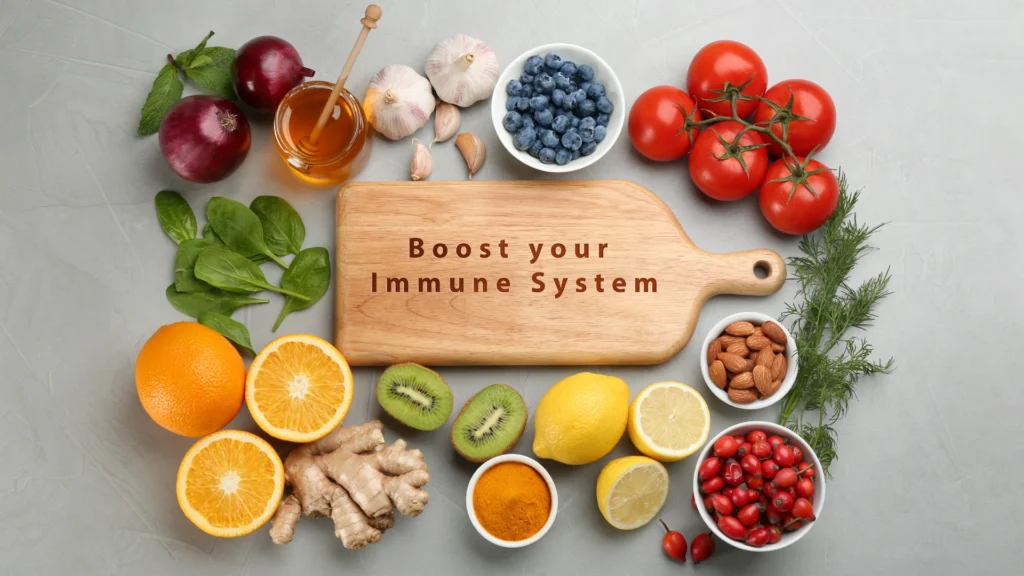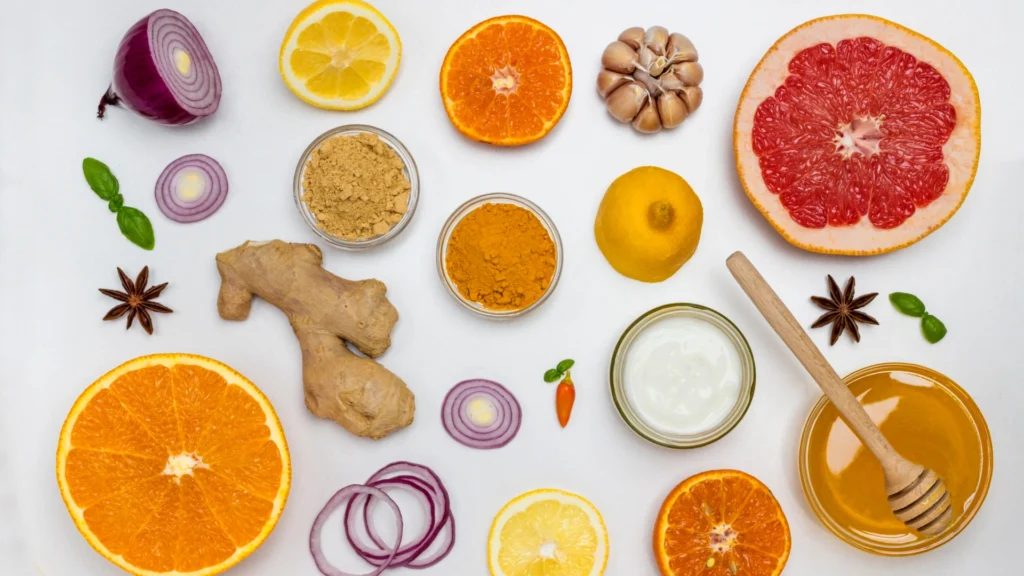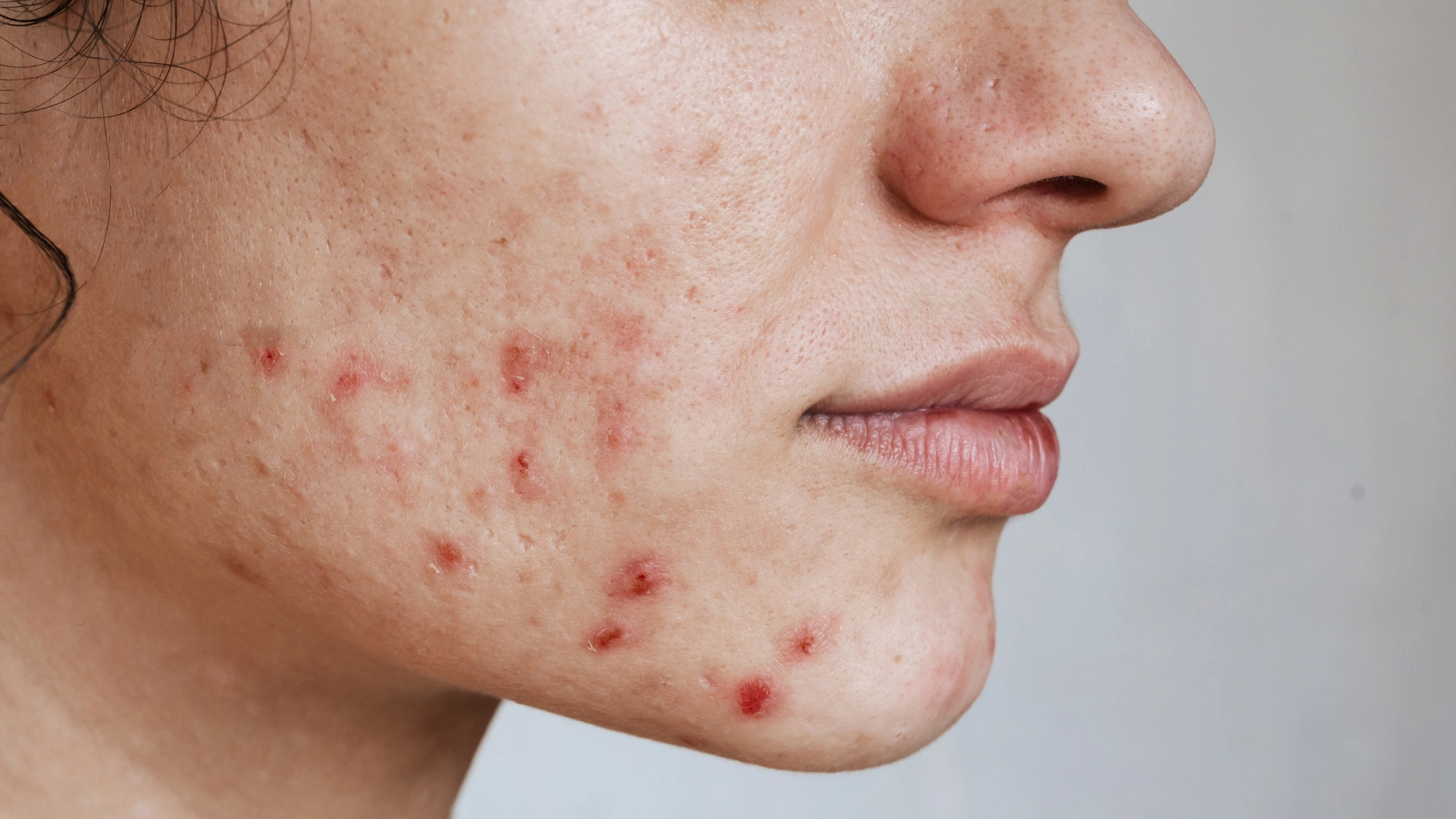
A strong immune system is essential for defending our bodies against infections and illnesses. While genetics and certain medical conditions can affect immunity, there are several natural ways to enhance your immune response. In this article, you will learn the most effective ways to naturally boost your immune system. These methods include lifestyle changes, dietary adjustments, and simple daily habits that can help strengthen your body’s defenses.
12 Ways to Boost Your Immune System Naturally
Your immune system is your body’s first defense against harmful pathogens. Incorporating certain habits into your daily routine can enhance your immunity and improve your overall health. Here are twelve ways to naturally boost your immune system.
Eat a Balanced Diet
Eating a balanced diet is crucial for maintaining a healthy immune system. Focus on consuming various fruits, vegetables, whole grains, lean proteins, and healthy fats. These foods provide essential nutrients like vitamins A, C, D, E, and zinc, which are vital for immune function. For example, citrus fruits and red bell peppers are rich in vitamin C, which supports the production of white blood cells that fight infections. Leafy greens, nuts, and seeds are excellent sources of vitamins A and E, which help regulate the immune response.
Stay Hydrated
Proper hydration is fundamental to keeping your immune system functioning optimally. Water helps produce lymph, which carries white blood cells and other immune system cells. Staying well-hydrated also ensures that your mucous membranes, which trap pathogens and prevent them from entering your body, remain moist and effective. Aim to drink at least eight glasses of water daily, and increase your intake if you are physically active or in a hot climate. Herbal teas and water-rich foods like cucumbers and watermelon can also contribute to your daily hydration needs.
Exercise Regularly
Regular physical activity is one of the best ways to boost your immune system. Exercise helps increase circulation, allowing immune cells to move through the body more efficiently and do their job effectively. Moderate exercise, such as brisk walking, cycling, or swimming, for at least 30 minutes most days a week, can significantly enhance your immune response. Additionally, regular exercise reduces inflammation and supports the regeneration of immune cells. It’s important to note that while moderate exercise boosts immunity, intense and prolonged exercise without adequate rest can have the opposite effect and may suppress the immune system.
Manage Stress Levels
Chronic stress can weaken your immune system, making you more susceptible to infections and diseases. Stress triggers the release of cortisol, a hormone that, in high levels, can suppress immune function. Managing stress effectively is crucial for maintaining a strong immune system. Techniques such as mindfulness meditation, deep breathing exercises, yoga, and regular physical activity can help reduce stress levels.
Wash Your Hands Frequently
Regular handwashing is a simple yet effective way to prevent the spread of infections and support your immune system. By washing your hands frequently with soap and water for at least 20 seconds, you can remove germs and reduce the likelihood of getting sick. Handwashing is especially important before eating, using the restroom, and touching surfaces in public places. If soap and water are unavailable, using an alcohol-based hand sanitizer can also help reduce the number of germs on your hands.
Avoid Smoking and Excessive Drinking
Smoking and excessive alcohol consumption can weaken your immune system and increase your susceptibility to infections. Smoking damages the respiratory system and impairs the function of immune cells, making it harder for your body to fight off respiratory infections. Similarly, excessive alcohol intake can disrupt the immune system’s balance, reducing its ability to defend against pathogens. To support your immune health, it’s essential to avoid smoking and limit alcohol consumption to moderate levels. For men, this means up to two drinks per day, and for women, up to one drink per day.
Incorporate Immune-Boosting Foods

Certain foods have properties that can help strengthen your immune system. Incorporating immune-boosting foods into your diet can give your body the nutrients it needs to fight infections. These foods include garlic, ginger, turmeric, yogurt, and green tea.
Maintain a Healthy Weight
Maintaining a healthy weight is important for keeping your immune system functioning properly. Obesity can impair immune function and increase the risk of infections and chronic diseases. Excess body fat, particularly around the abdomen, can lead to inflammation, negatively affecting the immune system. To achieve and maintain a healthy weight, focus on a balanced diet rich in fruits, vegetables, whole grains, and lean proteins, and engage in regular physical activity. Even moderate weight loss can have a positive impact on immune function.
Consider Herbal Supplements
Herbal supplements can be a helpful addition to your routine to boost your immune system. Some herbs have been traditionally used for their immune-enhancing properties. For example:
- Echinacea: Known to stimulate the immune system and may help reduce the duration of colds.
- Elderberry: Contains antioxidants and vitamins that may help boost immune function and reduce the severity of cold and flu symptoms.
- Astragalus: An adaptogen that helps the body resist stress and supports the immune system.
- Andrographis: This may help reduce symptoms of colds and flu and enhance immune response.
Stay up to Date on Vaccinations
Vaccinations play a crucial role in protecting your immune system against infectious diseases. Vaccines stimulate your immune system to recognize and fight specific pathogens without causing the disease. Staying current on vaccinations can help prevent illnesses such as influenza, pneumonia, and other vaccine-preventable diseases. Following the recommended vaccination schedule for your age group and health status is important. This includes annual flu shots and other vaccines as your healthcare provider advises. Vaccinations are a proven and effective way to boost your immune system and protect your health.
Practice Good Hygiene Habits
Good hygiene habits are essential for preventing infections and supporting your immune system. In addition to frequent handwashing, other key hygiene practices include:
- Covering your mouth and nose: To prevent the spread of germs, use a tissue or your elbow to cover coughs and sneezes.
- Avoid touching your face: Germs can enter your body through your eyes, nose, and mouth, so avoid touching your face with unwashed hands.
- Cleaning and disinfecting surfaces: Regularly clean and disinfect commonly touched surfaces, such as doorknobs, light switches, and mobile devices.
- Practicing safe food handling: To prevent foodborne illnesses, ensure food is cooked to the appropriate temperature and avoid cross-contamination.
Natural Ways to Boost Children’s Immune System

Boosting a child’s immune system naturally involves incorporating various healthy habits and practices into their daily routine. Here are some effective strategies:
- Balanced Diet: Ensure children eat fruits, vegetables, whole grains, lean proteins, and healthy fats. These foods provide essential vitamins and minerals that support immune function. Foods rich in vitamin C (oranges, strawberries), vitamin A (carrots, sweet potatoes), and zinc (lean meats, nuts) are particularly beneficial.
- Adequate Sleep: Children need sufficient sleep to maintain a strong immune system. Sleep helps the body repair and regenerate; lack of sleep can weaken immune responses. Establish a regular bedtime routine to ensure children get the recommended amount of sleep for their age group.
- Regular Physical Activity: Encourage children to engage in regular physical activity, such as playing outside, participating in sports, or simply being active throughout the day. Exercise helps improve circulation and supports immune function.
- Good Hygiene Practices: Teach children the importance of washing their hands frequently, especially before eating and after using the restroom. This simple habit can significantly reduce the risk of infections.
- Hydration: Ensure children drink plenty of water throughout the day to stay hydrated. Proper hydration supports overall bodily functions, including the immune system.
- Minimize Stress: Help children manage stress through relaxation techniques and creative activities, and ensure they have a supportive and loving environment. Chronic stress can negatively affect immune function, even in children.
- Limit Sugar Intake: High sugar intake can suppress the immune system. Reduce the consumption of sugary snacks and beverages and opt for healthier alternatives like fruits and nuts.
What Foods Naturally Boost the Immune System?
Certain foods are known for their immune-boosting properties and can be easily incorporated into your diet. Here are some of the most effective immune-boosting foods:
- Citrus Fruits: Oranges, grapefruits, lemons, and limes are high in vitamin C, which increases the production of white blood cells that help fight infections.
- Red Bell Peppers: Rich in vitamin C and beta-carotene, red bell peppers enhance immune function and support skin health.
- Broccoli: Packed with vitamins A, C, and E, as well as fiber and antioxidants, broccoli is one of the healthiest vegetables you can eat.
- Garlic: Contains compounds like allicin, which have immune-boosting properties. Garlic can help reduce the severity of colds and other illnesses.
- Ginger: Known for its anti-inflammatory and antioxidant effects, ginger can help reduce inflammation and support immune health.
- Spinach: High in vitamin C, beta-carotene, and antioxidants, spinach helps boost the immune system’s infection-fighting ability.
- Yogurt: Probiotics in yogurt promote a healthy gut microbiome, which is crucial for a strong immune system. Look for yogurts with live and active cultures.
- Almonds: Rich in vitamin E, almonds act as antioxidants and help maintain immune function. A small handful can provide a significant portion of your daily vitamin E needs.
- Turmeric: The curcumin in turmeric has powerful anti-inflammatory and antioxidant properties, which can enhance immune function.
- Green Tea: Contains flavonoids and antioxidants, green tea can support the immune system and improve overall health.
What Vitamins Are Crucial for a Strong Immune System?

Vitamins play a critical role in maintaining a robust immune system. Here are the key vitamins essential for immune health:
- Vitamin C: Known for its immune-boosting properties, it increases the production of white blood cells, which are vital for fighting infections. Foods rich in vitamin C include citrus fruits, strawberries, bell peppers, and broccoli.
- Vitamin D: Essential for immune function, vitamin D helps regulate the immune response and enhances the pathogen-fighting effects of monocytes and macrophages. The body can produce vitamin D when exposed to sunlight, but it can also be obtained from foods like fatty fish, fortified dairy products, and supplements.
- Vitamin A: Supports the health of the skin and mucous membranes, which are the body’s first line of defense against pathogens. It also plays a role in the production and function of white blood cells. Sources of vitamin A include carrots, sweet potatoes, spinach, and dairy products.
- Vitamin E: Acts as an antioxidant and helps protect cells from damage caused by free radicals. It also enhances immune responses. Vitamin E can be found in nuts, seeds, and green leafy vegetables.
- Vitamin B6: Important for biochemical reactions in the immune system, vitamin B6 produces antibodies. Foods rich in vitamin B6 include chicken, fish, potatoes, and bananas.
- Folate (Vitamin B9): Crucial for producing and maintaining new cells, including white blood cells. Folate can be found in leafy green vegetables, legumes, and fortified grains.
- Vitamin B12: Plays a role in producing white blood cells and maintaining the health of the nervous system. Sources of vitamin B12 include meat, fish, poultry, eggs, and fortified cereals.
Are There Any Herbal Supplements That Help With Immunity?
Yes, several herbal supplements are known to support and enhance immune function. Here are some notable ones:
- Echinacea: Commonly used to prevent and treat colds and respiratory infections, Echinacea is believed to stimulate the immune system and increase the production of white blood cells.
- Elderberry: Rich in antioxidants and vitamins, elderberry is known for its antiviral properties. It is often used to reduce the severity and duration of colds and flu.
- Astragalus: An adaptogen, astragalus has been used in traditional Chinese medicine to boost the immune system. It may help increase the production of white blood cells and improve the body’s resistance to infections.
- Andrographis: Known for its anti-inflammatory and immune-boosting properties, Andrographis is often used to reduce symptoms of colds and flu.
- Ginseng: Often used to improve energy levels and immune function, ginseng may help boost the immune system and increase resistance to infections.
How Does Stress Affect the Immune System?
Stress has a significant impact on the immune system. When you experience stress, your body releases stress hormones such as cortisol and adrenaline. While these hormones help you cope with immediate threats, chronic stress leads to sustained high cortisol levels, which can suppress immune function. This suppression makes you more susceptible to infections and illnesses. Additionally, stress can reduce the body’s ability to produce and respond to cytokines, which are vital for coordinating the immune response. Prolonged stress also leads to inflammation, weakening the immune system’s ability to fight pathogens. Managing stress through relaxation techniques, regular exercise, adequate sleep, and social support is essential for maintaining a healthy immune system.
Can Hydration Levels Impact Immune Health?
Yes, hydration levels can significantly impact immune health. Staying well-hydrated is crucial for maintaining the proper function of various bodily systems, including the immune system. Water is essential for producing lymph, a fluid in the circulatory system that carries white blood cells and other immune cells throughout the body. Proper hydration also helps keep the mucous membranes in the respiratory tract moist, which acts as a barrier to protect against pathogens. Dehydration can impair these barriers, making it easier for germs to enter the body and cause infections. Additionally, hydration supports the optimal function of the kidneys and liver, which are vital for filtering out toxins from the body.
Are Probiotics Effective in Boosting the Immune System?

Yes, probiotics are effective in boosting the immune system. Probiotics are beneficial bacteria that help maintain a healthy gut microbiome balance, which plays a crucial role in immune function. A healthy gut microbiome supports the production of antibodies and the activity of white blood cells that fight infections. Probiotics have been shown to enhance the immune response, reducing the severity and duration of respiratory infections and colds. For example, individuals who consume probiotics regularly experience fewer episodes of common colds and other respiratory infections, highlighting the positive impact of probiotics on immune health. By including probiotic-rich foods like yogurt, kefir, and fermented vegetables in your diet or by taking probiotic supplements, you can help support and strengthen your immune system.
What Are the Benefits of Sunlight for Immune Health?
Sunlight has several benefits for immune health, primarily due to its role in vitamin D production. When exposed to sunlight, your skin synthesizes vitamin D, which is crucial for the proper functioning of the immune system. Vitamin D enhances the pathogen-fighting effects of monocytes and macrophages, which are white blood cells that play a critical role in the immune response. It also decreases inflammation and modulates the immune response, reducing the risk of autoimmune diseases. Regular exposure to sunlight, about 10-30 minutes several times a week, can help maintain adequate vitamin D levels, supporting a robust and responsive immune system. However, it is important to balance sun exposure with skin protection to prevent the risk of skin cancer.
How Does Smoking Affect Immune System Strength?
Smoking significantly weakens the immune system, making the body more susceptible to infections and diseases. The chemicals in cigarette smoke, such as nicotine and tar, damage the respiratory system and impair the function of immune cells. Smoking reduces the effectiveness of white blood cells and antibodies, essential for fighting off infections. It also causes chronic inflammation, which can further weaken immune responses. Smokers are more prone to respiratory infections, such as pneumonia and bronchitis, and have a higher risk of chronic diseases, including cardiovascular diseases and cancer.
Can a Vegetarian Diet Improve Immune System Function?
A vegetarian diet can improve immune system function if it is well-balanced and includes a variety of nutrient-dense foods. Vegetarians often consume higher amounts of fruits, vegetables, whole grains, nuts, and seeds, rich in vitamins, minerals, and antioxidants that support immune health. For example, vitamins A, C, and E, found abundantly in plant-based foods, are crucial for immune function. Additionally, a vegetarian diet tends to be higher in fiber, which supports a healthy gut microbiome. A well-functioning gut microbiome is essential for a strong immune system, as it helps regulate immune responses and reduce inflammation. However, vegetarians need to ensure adequate amounts of vitamin B12, iron, and zinc, which are less abundant in plant-based foods but vital for immune health.
Are There Any Quick Tips to Boost Immunity Daily?
Yes, there are several quick tips to boost your immunity daily:
- Eat a Nutritious Breakfast: Start your day with a balanced meal with fruits, whole grains, and proteins to fuel your body and support your immune function.
- Stay Hydrated: Drink plenty of water throughout the day to keep your immune system functioning optimally.
- Get Enough Sleep: Aim for 7-9 hours each night to allow your body to repair and regenerate.
- Wash Your Hands: Regularly wash your hands with soap and water to prevent the spread of germs.
- Take a Walk: Moderate exercise, such as a brisk walk, improves circulation and supports immune health.
- Manage Stress: Practice stress-reducing techniques like deep breathing, meditation, or yoga.
- Include Probiotics: To support gut health, incorporate probiotic-rich foods, such as yogurt or fermented vegetables, into your diet.
- Avoid Smoking and Limit Alcohol. These habits can weaken your immune system, so it’s best to avoid or minimize them.
What Is the Role of Antioxidants in Immune Health?
Antioxidants play a crucial role in immune health by protecting the body’s cells from damage caused by free radicals. Free radicals are unstable molecules that can damage cells and contribute to chronic inflammation and diseases. Antioxidants neutralize free radicals, reducing oxidative stress and supporting overall immune function. Vitamins C and E, selenium, and beta-carotene are powerful antioxidants in many fruits and vegetables. These nutrients help maintain the integrity of immune cells and enhance the body’s ability to fight off infections. You can support your immune system and reduce the risk of illness by including antioxidant-rich foods like berries, nuts, green leafy vegetables, and citrus fruits.
Can Mindfulness or Meditation Enhance the Immune System?
Yes, mindfulness and meditation can enhance the immune system. These practices help reduce stress, which is known to suppress immune function. Chronic stress leads to elevated cortisol levels, impairing the immune response. Practicing mindfulness and meditation can lower stress levels and improve immune function. These techniques promote relaxation and have been shown to increase the activity of natural killer cells and T-cells, essential immune system components. Regular mindfulness and meditation practice can also enhance overall well-being and resilience, making the body more capable of responding to infections and maintaining health.









